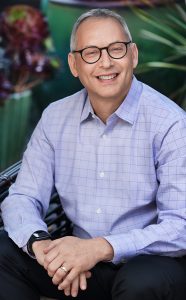After four years of writing, Richard Hasen initially finished his book, “Cheap Speech: How Disinformation Poisons our Politics and How to Cure It” in 2020 with an introduction that warned of political violence as a dangerous result of eroding faith in the electoral system. Weeks later, on Jan. 6, 2021, Hasen’s predictions came true before his manuscript even went to print. Now, with the next presidential election looming two years away, Hasen’s warnings remain the same.

Richard Hasen
“I hope students will realize they can’t take American democracy for granted,” Hasen said about his upcoming presentation about “Cheap Speech” on Sept. 23 from 12-1 p.m. in the Hinckley Institute Caucus Room. Hasen, an election law expert and professor at the UCLA School of Law, will visit campus as part of Constitution Week and the University of Utah’s Academic Freedom Committee’s initiative to encourage civic engagement. “The choices we face are not easy ones, and it is important for society to maintain a commitment to have free speech and free elections. I hope we will find a way to work through that.”
As a professor who has studied and written about election law for 30 years, Hasen has gotten his fair share of hate mail and death threats when debunking accusations of stolen elections. Nevertheless, Hasen is an advocate for free speech. It is a founding principle of democracy — as are free and fair elections, he says. The problem comes when people use free speech to make false claims and undermine our election system.
“The traditional answer is, the remedy for false speech is counter speech,” Hasen says. “If someone says something false, and you say something true, in the marketplace of ideas, the truth will emerge. But there is reason to believe that marketplace is broken.”
Hasen suggests the United States needs both legal changes and social changes to remedy the conflicts that can emerge between the commitment to free debate and free elections. Making it a crime to deliberately lie about when and where people can vote, requiring manipulated political videos to be labeled as altered, and signaling reliable sources are options, but none of these steps alone will solve the problem, Hasen says. In order to find a solution, Americans need to continue to have open dialogue and discuss difficult topics, he says, particularly on university campuses.
“Universities are places that are uniquely committed to the idea of free inquiry, and I hope, also committed to ideals of democracy, so it is a great place to have a conversation about this,” Hasen said. “How can we engage in this dialogue so these kinds of discussions can be fruitful, rather than lead to greater polarization? If you can’t do that on a university campus, you can’t really do that anywhere.”
